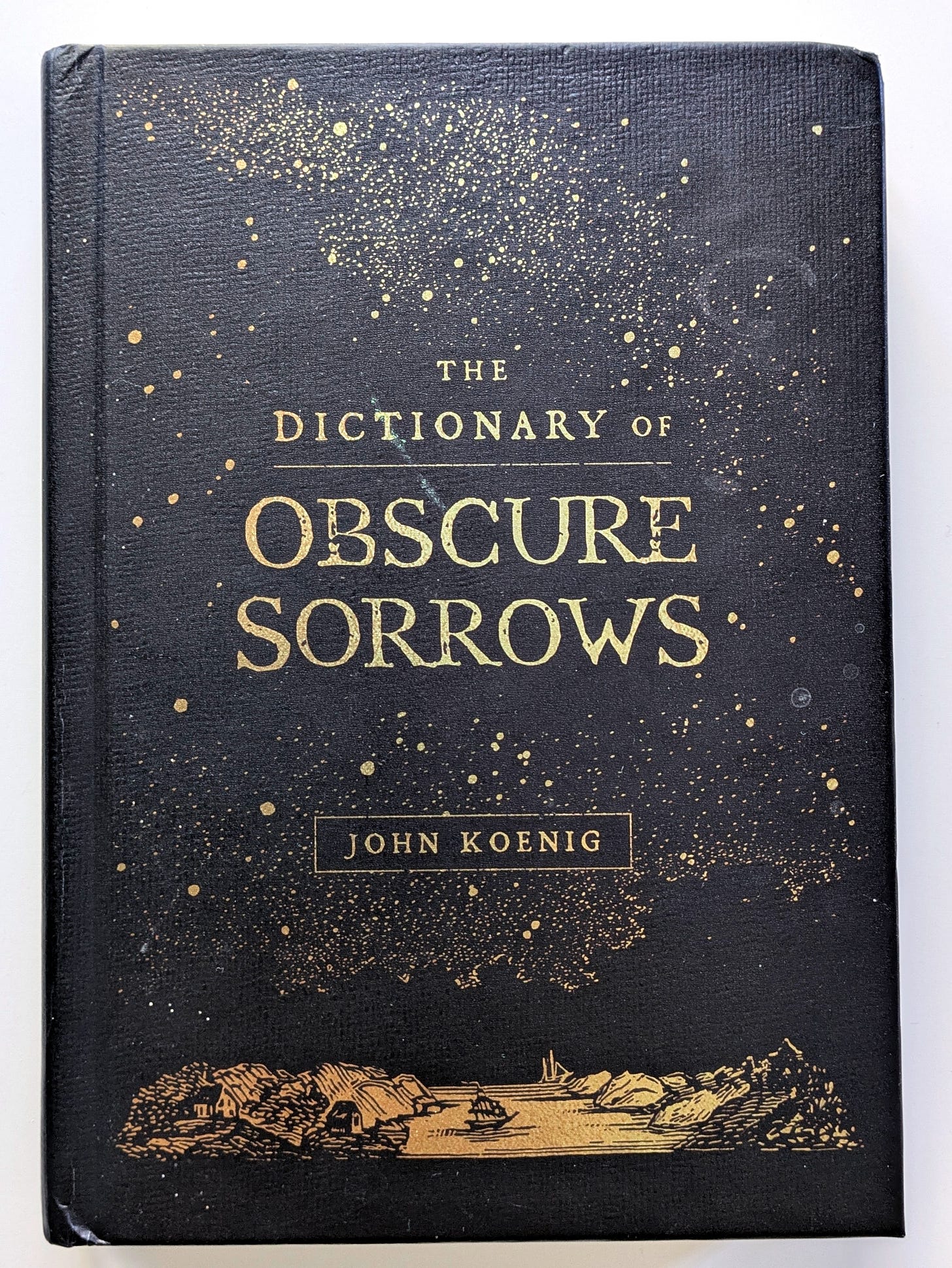Have you ever had a fleeting feeling and not been able to put a word to it? Maybe it was so specific that it applied only to your unique situation at the moment, or maybe it’s a common experience but so vague or uncomfortable no one has formally named it. Or maybe it’s just a feeling that was best described in a sentence rather than a single word.
If you’ve ever had one of these feelings before, I have the perfect book for you: The Dictionary of Obscure Sorrows by John Koenig. Koenig describes his book as “a dictionary—a poem about everything” and “a compendium of new words for emotions.” He aims to illuminate the experience of being human by offering thoughtful representations of life through its absurdities, coincidences, ups, downs, joys, and sorrows. As he notes,
It's a calming thing to learn there’s a word for something you’ve felt all your life but didn’t know was shared by anyone else. It’s even oddly empowering—to be reminded that you’re not crazy, you’re just an ordinary human being trying to make your way through a bizarre set of circumstances.
p. x
Koenig is also careful to clarify that even though the book is nominally about sorrows, his goal is to capture the fullness of life in all its emotional range. So while this dictionary contains plenty of entries on regret, despair, envy, and other strongly negative emotions, it’s also full of gentler and more reflective pangs that could be described more as observations about the world. I personally find myself drawn to the wistful and nostalgic, like these:
looseleft: feeling a sense of loss upon finishing a good book, sensing the weight of the back cover locking away the lives of characters you’ve gotten to know so well (p. 8)
midding: the tranquil pleasure of being near a gathering but not quite in it—hovering on the perimeter of a campfire, talking quietly outside a party…feeling blissfully invisible yet still fully included… (p. 85)
anemoia: nostalgia for a time you never experienced (p. 167)
énouement: the bittersweetness of having arrived here in the future, finally learning the answer to how things turned out but being unable to tell your past self (p. 203)
As you can see, not only is Koenig a keen observer of human life and emotion, but he has fun putting together bits and pieces of words that sound like they could be authentic. He plays around with languages—particularly Latin and Middle English-sounding words—repurposing older words (for example, clockwise to mean “aware that you’ll only ever be a certain age relative to your loved ones” or anchorage to say “the desire to hold onto time as it passes”) and inventing new ones as needed. Who’s to say that blinkback, poggled, kinchy, and ledsome aren’t *real* words? New words and phrases are coined all the time. If people use them and understand each other, then they are real words.
For me another fascinating aspect of Koenig’s project is the similarity it bears to the ancient Stoic effort to define and categorize negative emotions. The ancients were fascinated by emotions and spent a great deal of time thinking about all the ways negative emotions can be expressed. According to the records that have come down to us, they came up with many more negative emotions than positive ones. Some of the obscure sorrows Stobaeus tells us about include:
Rancor: anger biding its time for revenge
Misery: distress that produces speechlessness
Anguish: distress that settles deep inside
Reluctance: fear of impending activity
Bewitchment: delight through deceptive seeing
Cited in Graver, Stoicism and Emotion, p. 56
Perhaps it’s important to understand negative emotions in all their guises in order to resolve them. And perhaps it’s possible to turn some of these pangs into an acceptance and appreciation of the magnificent fullness of life. Rather than feeling a sense of sadness that things change and the people we love will eventually leave us, we can transform our sorrow into a deep understanding of the nature of things. From this perspective, I think it’s worth our while to deeply consider, even respect, the more somber moments of life. Defining our terms always helps us to be aware and cope with our difficulties in a more enlightened way.
So if you are a lover of words and want to expand your emotional awareness and vocabulary, I highly recommend a read through John Koenig’s Dictionary of Obscure Sorrows. Perhaps not life-changing, but certainly life-enhancing. And as Koenig reminds us with a smile (p. xi), “Words will never do us justice. But we have to try anyway.”




My favorite word from the DOS is Kenopsia, the feeling of being at a place outside of the time and purpose it's supposed to be used for, like being alone in school in the evening.